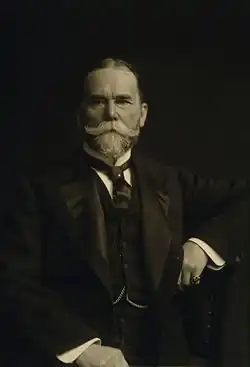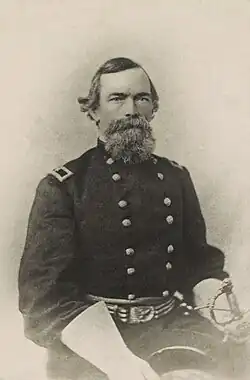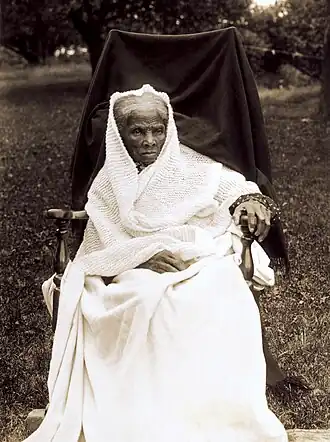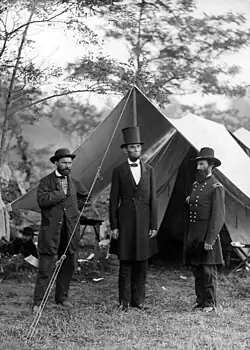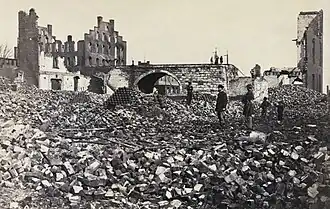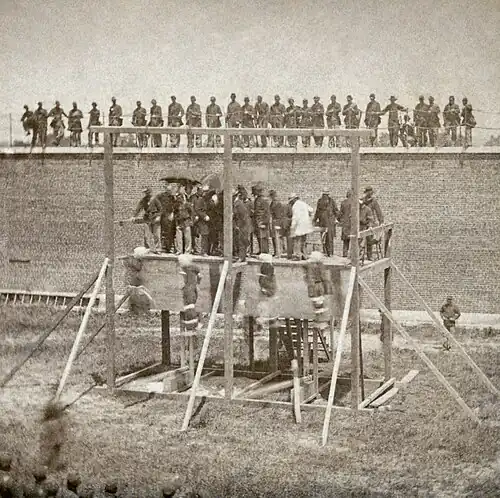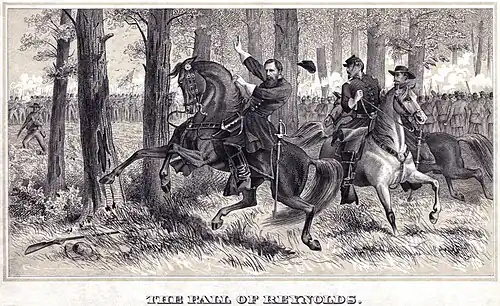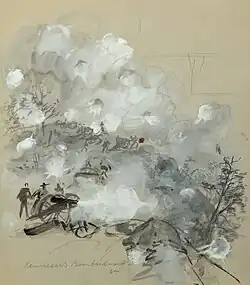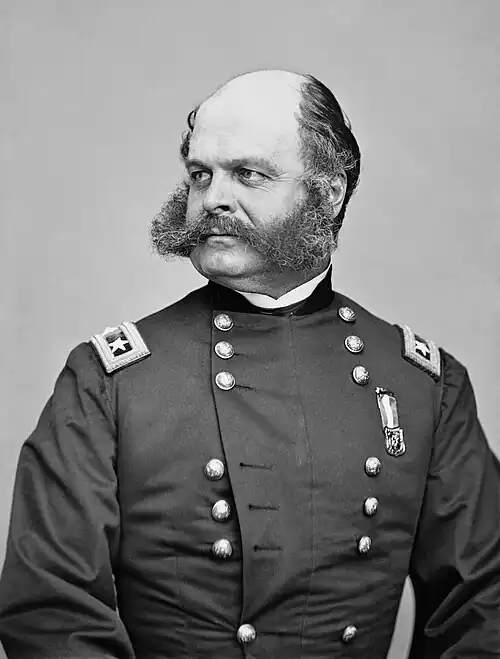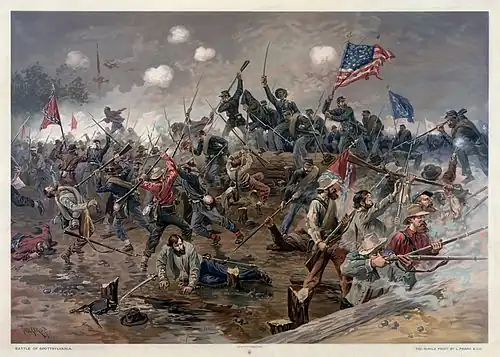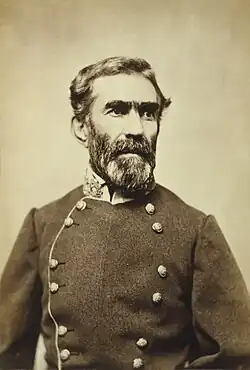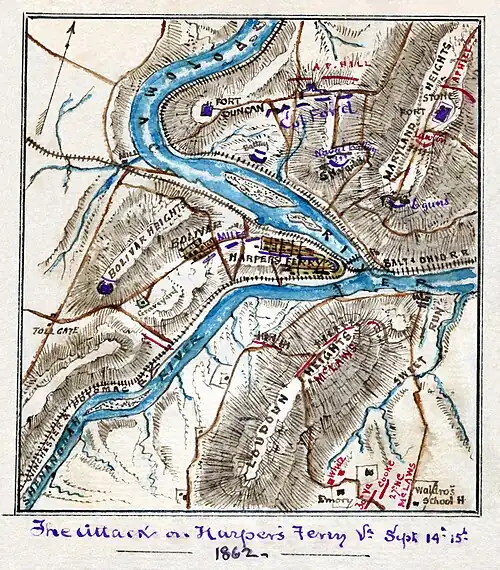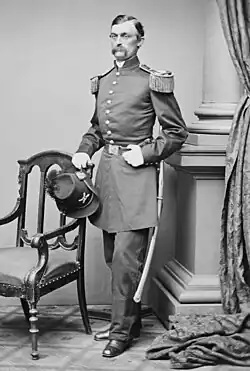Portal:American Civil War
.svg.png) |
|
.svg.png) |


 The American Civil War Portal
The American Civil War Portal
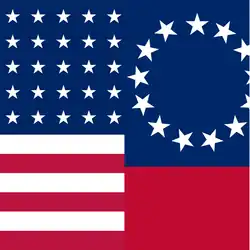
The American Civil War (1861–1865) was a sectional rebellion against the United States of America by the Confederate States, formed of eleven southern states' governments which moved to secede from the Union after the 1860 election of Abraham Lincoln as President of the United States. The Union's victory was eventually achieved by leveraging advantages in population, manufacturing and logistics and through a strategic naval blockade denying the Confederacy access to the world's markets.
In many ways, the conflict's central issues – the enslavement of African Americans, the role of constitutional federal government, and the rights of states – are still not completely resolved. Not surprisingly, the Confederate army's surrender at Appomattox on April 9,1865 did little to change many Americans' attitudes toward the potential powers of central government. The passage of the Thirteenth, Fourteenth and Fifteenth amendments to the Constitution in the years immediately following the war did not change the racial prejudice prevalent among Americans of the day; and the process of Reconstruction did not heal the deeply personal wounds inflicted by four brutal years of war and more than 970,000 casualties – 3 percent of the population, including approximately 560,000 deaths. As a result, controversies affected by the war's unresolved social, political, economic and racial tensions continue to shape contemporary American thought. The causes of the war, the reasons for the outcome, and even the name of the war itself are subjects of much discussion even today. (Full article)


 Featured article
Featured article
Asian Americans, who are Americans of Asian descent, have fought and served on behalf of the United States since the American Revolutionary War. During the American Civil War Asian Americans fought for both the Union and the Confederacy. Afterwards Asian Americans served primarily in the U.S. Navy until the Philippine–American War.
At the beginning of the 20th century, Asian Americans began to attend U.S. military academies, and the first Asian Americans were awarded the Medal of Honor. World War I saw Asian Americans serving as "non-whites" in the National Army. After World War I, Asian American service fell into obscurity until World War II when significant contributions by Japanese, Chinese, Filipino, and Korean Americans were documented. (Full article...)


 Grand Parade of the States
Grand Parade of the States
.jpg)
During the American Civil War, North Carolina joined the Confederacy with some reluctance, mainly due to the presence of Southern Unionist sentiment within the state. A popular vote in February, 1861 on the issue of secession was won by the unionists but not by a wide margin.
This slight lean in favor of staying in the Union would shift towards the Confederacy in response to Abraham Lincoln's April 15 proclamation that requested 75,000 troops from all Union states, leading to North Carolina's secession. Similar to Arkansas, Tennessee, and Virginia, North Carolina wished to remain uninvolved in the likely war but felt forced to pick a side by the proclamation. Throughout the war, North Carolina widely remained a divided state. The population within the Appalachian Mountains in the western part of the state contained large pockets of Unionism. Even so, North Carolina would help contribute a significant amount of troops to the Confederacy, and channeled many vital supplies through the major port of Wilmington, in defiance of the Union blockade. (Full article...)


 Featured biography
Featured biography
Timothy Henry Hoʻolulu Pitman (March 18, 1845 – February 27, 1863) was an American Union Army soldier of Native Hawaiian descent. Considered one of the "Hawaiʻi Sons of the Civil War", he was among a group of more than one hundred documented Native Hawaiian and Hawaii-born combatants who fought in the American Civil War while the Kingdom of Hawaiʻi was still an independent nation.
Born and raised in Hilo, Hawaiʻi, he was the eldest son of Kinoʻoleoliliha, a Hawaiian high chiefess, and Benjamin Pitman, an American pioneer settler from Massachusetts. Through his father's business success in the whaling and sugar and coffee plantation industries and his mother's familial connections to the Hawaiian royal family, the Pitmans were quite prosperous and owned lands on the island of Hawaiʻi and in Honolulu. He and his older sister Mary were educated in the mission schools in Hilo alongside other children of mixed Hawaiian descent. After the death of his mother in 1855, his father remarried to the widow of a missionary, thus connecting the family to the American missionary community in Hawaiʻi. However, following the deaths of his first wife and later his second wife, his father decided to leave the islands and returned to Massachusetts with his family in 1861. The younger Pitman continued his education in the public schools around Boston. (Full article...)


 WikiProjects
WikiProjects
- Military history WikiProject
- American Civil War task force
- United States military history task force
- United States WikiProject
- History WikiProject
- Biography WikiProject


 Featured picture
Featured picture


 Did you know...
Did you know...
- ... that an African-American was appointed postmaster of Baynesville, Virginia, in 1893 in preference to a former Confederate soldier?
- ... that Dethloff Willrodt fought for the Union army on the first day of the Battle of Gettysburg on July 1, 1863, having previously been a soldier in the Confederate army?
- ... that singer Frank Croxton performed a duet with his father for the unveiling of a monument to a Confederate States Army general?
- ... that Colonel Bradley Winslow was brevetted by US president Abraham Lincoln for "brave and gallant conduct" during the siege of Petersburg in the American Civil War?
- ... that some Confederate bullets were sourced from a silver mine?
- ... that Benjamin Jackson was likely paid at least $300 to fight in the American Civil War as Lewis Saunders?


 Subcategories
Subcategories


 American Civil War topics
American Civil War topics


 Related portals
Related portals


 Things you can do
Things you can do
- Attention needed
- ...to referencing and citation • ...to coverage and accuracy • ...to structure • ...to grammar • ...to supporting materials
- Popular pages
- Full list
- Cleanup needed
- The West Tennessee Raids
- Requested articles
- James Ashby (soldier) • Benjamin D. Fearing • James B. Speers • Charles S. Steedman • Battle of Barton's Station • Lawrence P. Graham • Frederick S. Sturmbaugh • Mexico and the American Civil War • Savannah Campaign Confederate order of battle • Native Americans in the American Civil War (currently disambiguation after deletion) • Battle of Lafayette • Battle of Sunshine Church • Tangier Difficulty • Requested American Civil War Medal of Honor recipients
- Expansion needed
- Battle of Boonsborough • Battle of Guard Hill • Battle of Rice's Station • Battle of Simmon's Bluff • Battle of Summit Point • Charleston Arsenal • Edenton Bell Battery • First Battle of Dalton • Blackshear Prison • Edwin Forbes • Hiram B. Granbury • Henry Thomas Harrison • Louis Hébert (colonel) • Benjamin G. Humphreys • Maynard Carbine • Hezekiah G. Spruill • Smith carbine • Edward C. Walthall • Confederate States Secretary of the Navy • Confederate States Secretary of the Treasury • David Henry Williams • Battle of Rome Cross Roads • Delaware in the American Civil War • Ironclad Board • United States Military Railroad • Kansas in the American Civil War • Rufus Daggett • Ebenezer Magoffin • Confederate Quartermaster-General's Department • First Corps, Army of Northern Virginia • Francis Laurens Vinton • Henry Maury • Smith's Expedition to Tupelo • Ambrose Dudley Mann • Patrick Neeson Lynch • Stone Fleet (add international reactions and diplomacy) • Other American Civil War battle stubs • Other American Civil War stubs
- Images needed
- Battle of Lone Jack • Preston Pond, Jr. • Melancthon Smith
- Merging needed
- 1st Regiment New York Mounted Rifles and 7th Regiment New York Volunteer Cavalry
- Citations needed
- 1st Alabama Cavalry Regiment (Union) • 4th Maine Battery • 33rd Ohio Infantry • 110th New York Volunteer Infantry • Battle of Hatcher's Run • Camp Dennison • Confederate colonies • CSS Resolute • Dakota War of 1862 • Florida in the American Civil War • Ethan A. Hitchcock (general) • Fort Harker (Alabama) • Gettysburg (1993 film) • Iowa in the American Civil War • Second Battle of Fort Sumter • Samuel Benton
- Translation needed
- Add an article here!


 Associated Wikimedia
Associated Wikimedia
The following Wikimedia Foundation sister projects provide more on this subject:
-
Commons
Free media repository -
Wikibooks
Free textbooks and manuals -
Wikidata
Free knowledge base -
Wikinews
Free-content news -
Wikiquote
Collection of quotations -
Wikisource
Free-content library -
Wikiversity
Free learning tools -
Wikivoyage
Free travel guide -
Wiktionary
Dictionary and thesaurus
-
 List of all portals
List of all portals -

-

-

-

-

-

-

-

-

-
 Random portal
Random portal -
 WikiProject Portals
WikiProject Portals
- Shortcuts to this page: Portal:ACW • P:ACW

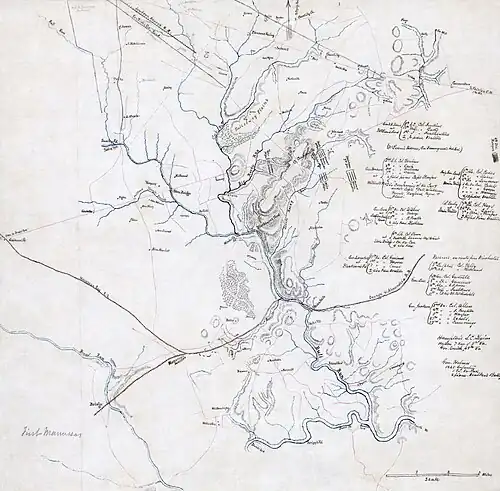


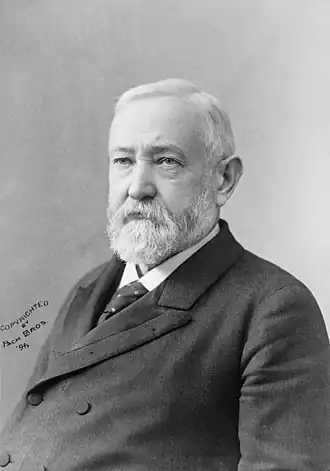

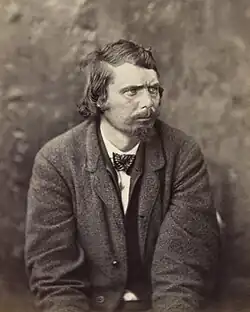

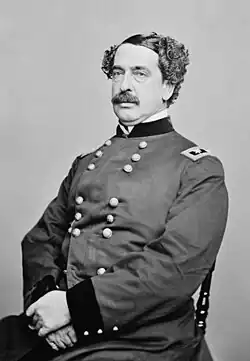

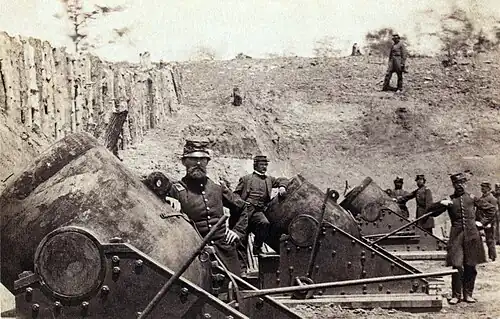
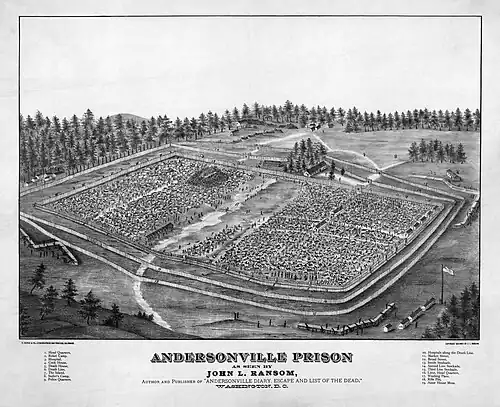
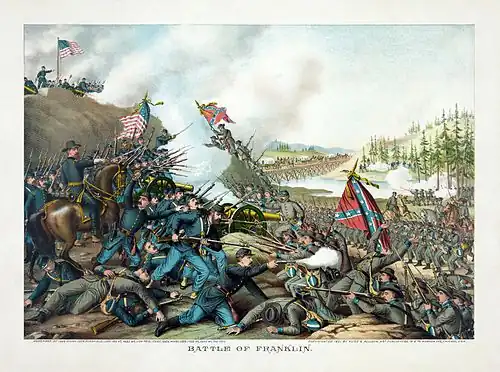

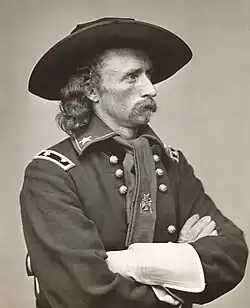

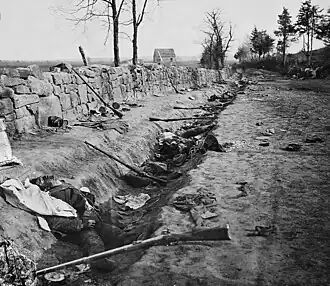
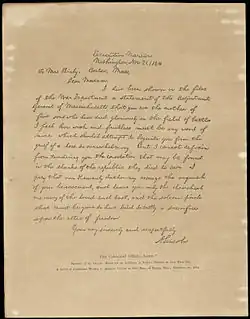

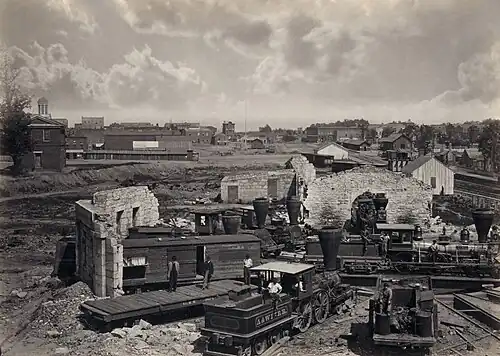
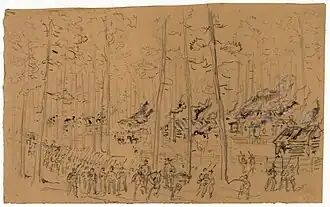
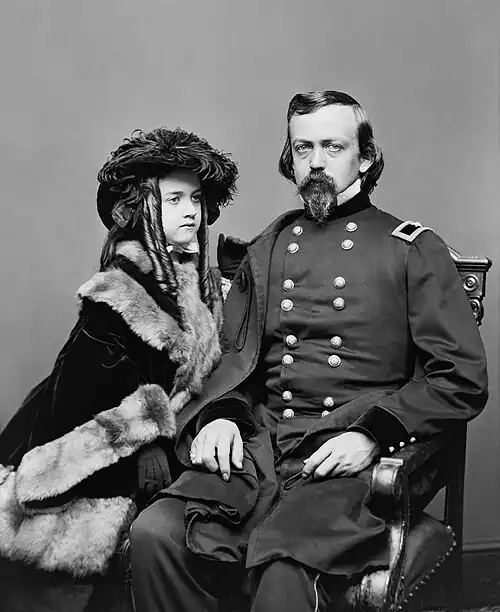
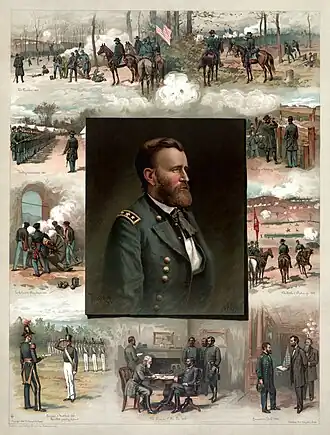
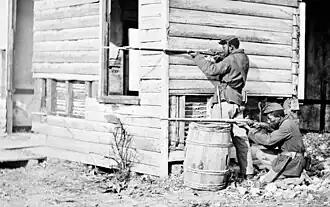



.jpg)
